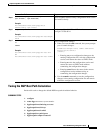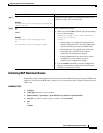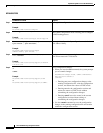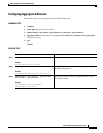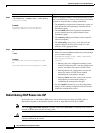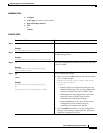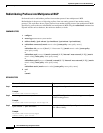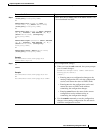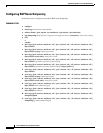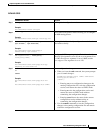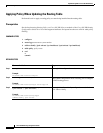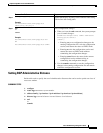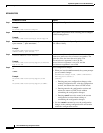
Implementing BGP on Cisco IOS XR Software
How to Implement BGP on Cisco IOS XR Software
RC-47
Cisco IOS XR Routing Configuration Guide
Step 4
redistribute connected [metric
metric-value
]
[route-policy
route-policy-name
]
or
redistribute isis
process-id
[level {1 |
1-inter-area | 2}] [metric
metric-value
]
[route-policy
route-policy-name
]
or
redistribute ospf
process-id
[match {external
[1 | 2] | internal | nssa-external [1 | 2]]}
[metric
metric-value
] [route-policy
route-policy-name
]
or
redistribute ospfv3
process-id
[match {external
[1 | 2] | internal | nssa-external [1 | 2]]}
[metric
metric-value
] [route-policy
route-policy-name
]
or
redistribute static [metric
metric-value
]
[route-policy
route-policy-name
]
Example:
RP/0/RP0/CPU0:router(config-bgp-af)#
redistribute ospf 110
Causes IPv4 unicast OSPF routes from OSPF instance 110
to be redistributed into BGP.
Step 5
end
or
commit
Example:
RP/0/RP0/CPU0:router(config-bgp-af)# end
or
RP/0/RP0/CPU0:router(config-bgp-af)# commit
Saves configuration changes.
• When you issue the end command, the system prompts
you to commit changes:
Uncommitted changes found, commit them before
exiting(yes/no/cancel)?
[cancel]:
–
Entering yes saves configuration changes to the
running configuration file, exits the configuration
session, and returns the router to EXEC mode.
–
Entering no exits the configuration session and
returns the router to EXEC mode without
committing the configuration changes.
–
Entering cancel leaves the router in the current
configuration session without exiting or
committing the configuration changes.
• Use the commit command to save the configuration
changes to the running configuration file and remain
within the configuration session.
Command or Action Purpose



